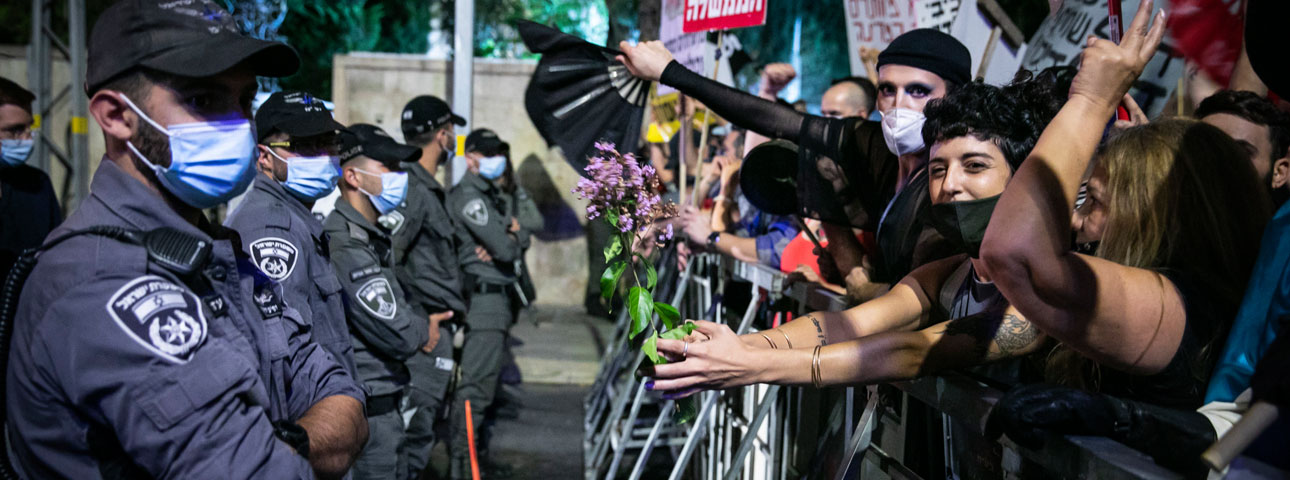Task Number One for the Incoming Police Commissioner
The public has given the Police a failing grade for fairness and transparency. Does the public believe this can change? Not really

Flash 90
Over the past year, the coronavirus pandemic and the never-ending political crisis have posed many challenges to Israeli society. The Israel Police has had to bear much of the burden of enforcing the draconian restrictions imposed by the Government to deal with the pandemic, while at the same time protecting the freedom of expression of the many demonstrators for and against the Prime Minister. And it has been doing all of this without a permanent Police Commissioner to lead and guide it in these difficult times.
On top of these challenges is the problematic image that has dogged the police for years, and the allegations of overpolicing against minorities; the excessive use of force, including in order to break up demonstrations; the lack of effective oversight both from within and from outside bodies, such as the Police Investigations Department in the Justice Ministry; and the ineffectual efforts to reduce crime in the Arab sector.
Despite the difficult and demanding work by the Police during the past year, the 2020 Democracy Index published by the Israel Democracy Institute reveals that the public gives the Police a failing grade on its management of these challenges.
This is indicated first of all by the drop in the public's confidence in the Police, which has fallen among Jews from 44% in 2019 to 41% in October 2020. A particularly sharp decline was registered among those on the left side of the political map (from 55% in 2019 to 34% in October), which can be attributed to their perception that the Police response to the demonstrations has been abusive and politically biased. Among Israeli Arabs as well, there has been a substantial decrease in trust in the police (from 38% in 2019 to 26% in October 2020), evidently because of what is perceived as overpolicing directed at them (we will get back to this below) and its lack of effectivity in combatting crime in the Arab sector.
The risk of increased distrust of the police resulting from the battle against the pandemic and the demonstrations was clear from the outset. The police were sometimes arbitrary and abusive in their treatment of demonstrators—with officers confronting people who do not normally have contact with the police. To the overall decline in trust can be added the perception of overpolicing, as reflected in the findings of the Index. Almost three-quarters of Arab citizens (73%) believe that they are the targets of overpolicing. Moreover, 82% believe that the police are much more thorough in dealing with crime in the Jewish sector than among Arabs.
These troubling perceptions are not unfounded, and are compatible with the official data we received from the Police a few months ago, in response to a freedom of information request. Note this: In the first half of 2020, Arabs—about 20% of Israel's population-- accounted for slightly more than 50% of Police arrests of Israeli citizens. Over the years, indictments have been filed against only about a third (33%) of the Arabs arrested, as compared with 50% of Jews. This is a clear indication of ineffective policing that leads to unnecessary arrests.
The perception of overpolicing is not limited to Arab citizens. Some 70% of the ultra-Orthodox believe that the police uses excessive force again them; 61.5% of the general Israeli public believes that this is also the case with regard to Israelis of Ethiopian descent.
The bottom line is that the Israel Police has not succeeded in giving the public the sense that it operates in a professional, fair, and equal manner vis-à-vis all sectors of the population, with no discrimination or bias. Can we expect this to improve? That is far from certain. Some 70% of Israelis believe that the Police does not take criticism seriously enough. And by the way, you won't be surprised to learn, that there is a strong correlation between those who hold this view and those who say that they do not have confidence in the Police.
In order to mend its ways and improve its public image, the Police must begin by taking a number of steps. First of all, it is clear that the lack of a permanent Police Commissioner and the attempts by the Minister of Internal Security to intervene in how police officers deal with demonstrations have ravaged its image as a professional and apolitical organization. The first task on the next Police Commissioner's to do list must be to make sure that the police are guided by objective considerations only, and make this clear to the public.
In addition, the Police must tighten its cooperation with external oversight agencies, and especially with the Police Investigation Department, which more than once has run into a wall of silence by police officers. It is also important to bolster the monitoring and disciplinary mechanisms within the Police—the Department of Discipline, the Public Complaints Unit and investigating officers—in part by increasing their autonomy and the transparency of their work, and their effective use of a database of complaints submitted against police officers.
The article was published in Times of Israel.
